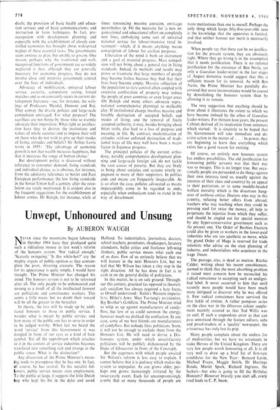Unwept, Unhonoured and Unsung
By AUBERON WAUGH
In theory, the loss will be made up by addi- tional honours to those in public service. I wonder what is meant by public service, and how many of the public one has to serve in order to be judged worthy. When last we heard the word 'service' from this Government it was dangled in front of our eyes as a kind of hate symbol. Yet all the opprobrium which attaches to it in the context of service industries becomes translated into something rich and strange in the public cause. What is the distinction?
Any discussion of the Prime Minister's mean- ing tends to presuppose that he has one. In fact, of course, he has several. To his socialist fol- lowers, public service means state employment. To the public at large, it suggests the little Dutch boy who kept his fist in the dyke and saved
Holland. To industrialists, journalists, doctors, school teachers, prostitutes, shopkeepers, lavatory attendants, ballet critics and freelance left-wing thinkers, public service means what each one of us does. Few of us seriously believe that we will feature in the next Honours List, but we feel that Mr Wilson has taken a tiny step in the right direction. All he has done in fact is to cash in on the general dislike of politicians.
In this matter, he is on safe ground. Through- out this century, practical (as opposed to theoreti- cal) socialism has always required a hate focus, as Orwell understood : Stalin's Western imperia- liqs; Hitler's Jews; Mao Tse-tung's revisionists; Big Brother's Goldfein. The Prime Minister tried to whip us up against manufacturers of candy- floss, but few of us could summon the energy, however much we disliked the confection. In any case, some of my best friends are manufacturers of candyfloss. But nobody likes politicians. Soon, it will not be enough to exclude them from the Honours List. He will need to devise a Dis- honours system, under which unsatisfactory politicians will be publicly dishonoured by the Duke of Gloucester in front of the Cenotaph.
But the eagerness with which people awaited Mr Wilson's reform is less easy to explain. I cannot believe that it is jealousy which makes the system so unpopular. As one grows older, per- haps one grows increasingly irritated by the twice-yearly event. Each list uncompromisingly asserts that so many thousands of people are more meritorious than one is oneself. Perhaps the only thing which keeps fifty-five-year-olds sane is the knowledge that the apparatus is farcical, and that neither honour nor merit is necessarily involved.
When people say that there can be no justifica- tion for the present system, they are obviously .right. Where they go wrong is in the assumption that it needs justification. There is no rational justification for the existence of Ben Nevis, yet only a Guardian leader-writer in the last stages of August dementia would suggest that this is sufficient reason for its removal. As with Ben Nevis, the Prime Minister has painfully dis- covered that more inconvenience would be caused by demolishing the honours system than by allowing it to remain.
The very suggestion that anything should be done about it illustrates the extent to which we have become imbued by the ethos of Guardian leader-writers. For thirteen lean years, the present Cabinet derived all its inspiration from sentences which started : 'It is sincerely to be hoped that the Government will take immediate and de- cisive action in the matter of . . In power, they are beginning to learn that everything which exists has a good reason for existing.
Of course, an entirely new honours system has endless possibilities. The old justification for honouring public servants was that their pay was so meagre. This is no longer true. But occa- sionally people are persuaded to do things against their own interests (and so, usually against the interests of their class and country) by an appeal to their patriotism, or to some muddle-headed welfare morality which is the disastrous hang- over of noblesse oblige. Doctors who stay in this country, refusing better offers from abroad, teachers who stay teaching when they could be pressing steel for twice the money, all help to perpetuate the injustice from which they suffer, and should be singled out for special mention by any hyper-conservative government such as the present one. The Order of Boobies Etcetera could also be given to workers in the lower-paid industries who are too apathetic to move, while the grand Order of Mugs is reserved for trade unionists who advise on the state planning of industry, and industrialists who acquiesce in the wage freeze.
The peerage, alas, is dead as mutton. Ritchie Calder, writing about his recent ennoblement, seemed to think that the most absorbing problem it raised must concern how he reconciled his radical conscience to accepting such an undigni- fied label. It never occurred to him that until recently most people would have been much more intrigued to discover why he was offered it. Few radical consciences have survived the first tickle of ermine. A rather pompous series on the class war in the Observer colour supple- ment recently assured us that Ted Willis was an earl. If such a stupendous error as that can pass unnoticed through the feature editors, subs and proof-readers of a 'quality' newspaper, the aristocracy has truly lost its grip.
Many people complain about the endless list of mediocrities, but we have no astronauts to make Heroes of the United Kingdom. There are very few people worth honouring at all. It is all very well to draw up a brief list of first-rate candidates for the New Year: Bernard Levin, Michael Frayn, Maggie Smith, Dr Hastings Banda, Muriel Spark, Richard Ingrams, the Seekers—but who is going to fill the Birthday Honours? However bravely you start off, every road leads to C. P. Snow.


































 Previous page
Previous page